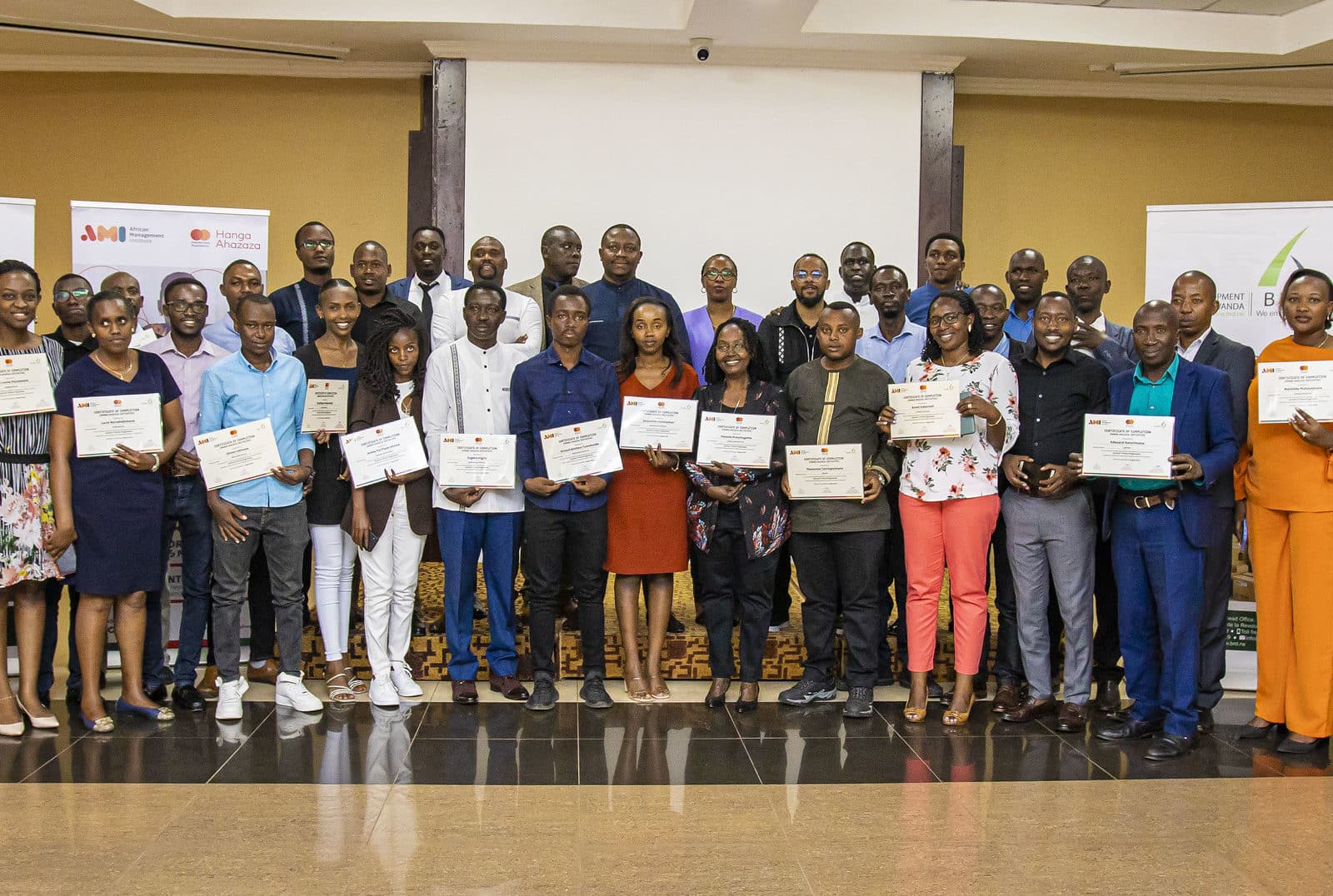The Development Bank of Rwanda and African Management Institute Enable Rwandan Businesses to be Resilient to Risk
26th August 2022

The Development Bank of Rwanda and the African Management Institute are working together to ensure businesses in Rwanda can face the future with confidence and be resilient to risk. Through this innovative partnership 32 entrepreneurs and their senior managers from 27 businesses across Rwanda have graduated from the AMI’s ‘Survive to Thrive’ programme, which supports entrepreneurs to protect their businesses against risk, navigate some of the pandemic challenges, and build resilience, and growth.
As a result of the partnership, the entrepreneurs completed AMI’s four-month ‘Survive to Thrive’ programme where they learned how to plan for and navigate around a range of challenges like reduced revenue and cash flow, they were taken through the dynamics of customers and market as well as learned how to plan for growth. All 32 graduates received their certificates of completion this morning at Lemigo Hotel, where they were able to meet and interact with representatives from the Development Bank of Rwanda and the Mastercard Foundation who fully covered the entrepreneurship programme under the Hanga Ahazaza Initiative
AMI’s business coaches and experts equipped the graduates with a wide range of business development knowledge and skills. They participated in high-impact capacity building sessions on effective business management, risk assessment as well as financial planning and reporting. Following the training, 94% of them reported an increase in revenue, 79% reported an increase in profit and 68% reported to have created jobs.
“Congratulations to all entrepreneurs who have graduated! In today’s business world, effective risk management plays a vital role. Our ‘Survive to Thrive’ programme provides a one-of-a-kind opportunity to Implement research-backed business practices that lead to growth. I am more delighted that this is the first in-person graduation under the Hanga Ahazaza Initiative since the beginning of the COVID19 Pandemic. We are delighted to have partnered with the Development Bank of Rwanda to support entrepreneurs and strengthen their business resilience. ” said Malik Shaffy, AMI Rwanda Country Manager.
To ensure the programme attracts qualified applicants, BRD supported AMI’s outreach efforts and disseminated programme information to its wide network of entrepreneurs. Commenting on the partnership, Kampeta Sayinzoga, the Chief Executive Officer of the Development Bank of Rwanda said:
“For many years, the Development Bank of Rwanda has provided innovative financial solutions to achieve sustainable socio-economic impact. Private sector businesses are the backbone of our economy, and we strive to ensure entrepreneurs have adequate skills and knowledge required to succeed whilst achieving their optimal potential. Partnering with the African Management Institute boosted our strategy to spur our technical assistance and business advisory to our valued stakeholders.”
The graduation ceremony provided an opportunity for entrepreneurs to share insights on the skills and knowledge they gained from the programme and how it’s going to be beneficial for their businesses.
“In the world of business today, you have to continuously learn to keep up with demand and competition. I’m grateful to the African Management Institute and the Development Bank of Rwanda for always empowering entrepreneurs in Rwanda,” – said Melanie Mukamugema, one of the programme graduates from Energy and Education
In addition to learning how to protect businesses against risks, beneficiaries of this partnership had access to a community of entrepreneurs who have successfully graduated from AMI programmes, networking events and will continue to benefit from AMI’s world-class business tools, and resources.
About the African Management Institute
The African Management Institute (AMI) enables enthusiastic businesses across Africa to thrive through practical tools and training. It equips entrepreneurs with tools to build their businesses, help companies train their teams and run work readiness programmes for young people starting their careers. AMI’s programmes combine online and mobile tools with in-person workshops and on-the-job practice and support. During the Covid-19 period, AMI has delivered fully virtual programming across the continent.
AMI has worked with a range of businesses and organisations to support entrepreneurs and managers build and grow their businesses across Africa including Uber, Nestle, Radisson Blu, RwandAir, Mastercard Foundation, USAID, Shell Foundation and Equity Bank. AMI has directly trained more than 30,000 people in over 30 countries and has offices in Nairobi, Kigali and Johannesburg.
For more information, visit africanmanagers.org/rwanda.
About the Development Bank of Rwanda
The Development Bank of Rwanda (BRD) Plc is the Rwanda’s only National Development Finance Institution with the mandate to support the development of the private sector with a focus on priority sectors aligned to the national strategic goals. The Bank which has marked 55 years of existence this year, has contributed to the country’s economic growth and development through financial and non-financial investments in key growth areas and progressively realigns itself to ensure relevance and enhanced value creation, competitiveness and sustainability of its operations. Through its financial and non-financial products and services the Bank supports small, medium and large enterprises directly or through other financial institutions to reach wider market base.
For more information, visit www.brd.rw.
Related posts

To Grow or Not to Grow: The Founder’s Dilemma
For many entrepreneurs, the decision to scale is exciting yet challenging. Growth offers opportunities like better supplier rates and access to larger markets, but it also increases the complexity of managing operations, staff, and finances, forcing entrepreneurs to balance ambition with the demands and risks of expansion.

Will Humans Outperform AI in Management?
As AI continues to integrate into the workplace, the question of whether humans will outperform machines in management arises. While AI excels at analyzing data, automating repetitive tasks, and providing insights, humans still have a distinct advantage when it comes to leadership and decision-making.

How to Balance Rules and Energy for Effective Leadership
Jonathan Cook's article examines the balance between rules and creativity in effective leadership. He argues that while rules provide essential structure, excessive rules can stifle innovation and lead to bureaucracy. Conversely, a lack of structure can result in chaos. Cook emphasizes that good rules empower teams by fostering creativity while maintaining direction, highlighting the need for leaders to strike a balance that allows both energy and structure to thrive.